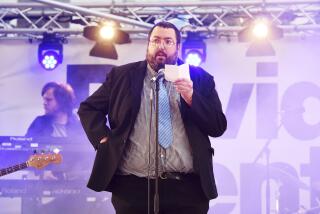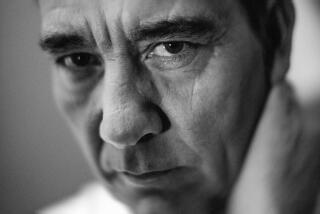Rowan Atkinson finds U.S. a tough bean to crack
If British comedian Rowan Atkinson had any doubts about his international appeal, they’ve been put to rest by stories he keeps hearing from English aid workers returning from trips to Africa.
“They go to these African villages where there are four thatched huts,” said Atkinson, 56. “There is nobody in any of them except one, where the entire village is crammed in there. There’s a tiny black-and-white TV set being powered by a car battery, and there’s a ‘Mr. Bean’ VHS tape being played.”
Mr. Bean is the man-child Atkinson played on Britain’s ITV from 1990 to 1995. A cross between Charlie Chaplin and France’s Jacques Tati, Bean is basically a silent character who causes havoc wherever he goes. A Christmas episode found him trying to stuff a turkey, only to have his head inserted into the gigantic bird. His best friend was a knit teddy bear. The intermittent, 14-episode series won numerous awards and aired in the U.S. in the 1990s on HBO and PBS, where it developed a cult following.
Atkinson took the character to the big screen in 1997’s “Bean” and 2007’s “Mr. Bean’s Holiday.” Both were international blockbusters. He also had great success with his pompous, smug and hopelessly inept James Bond wannabe “Johnny English” in 2003. The sequel, “Johnny English Reborn,” which Universal Pictures is opening in the U.S. on Friday, has already made $85 million internationally in three weeks of release.
Yet Atkinson has found it surprisingly tough to break into the U.S. comedic mainstream — the first “Johnny English” took in only $28 million here. American audiences probably still know him best as the voice of the officious red-billed hornbill major domo Zazu in 1994’s “The Lion King,” which became a box-office hit again this fall in a 3-D version.
“Here you have a very particular and sort of unique television market,” he said in a recent interview in L.A. about his difficulties breaking out stateside. “Unless you have volume of production, it’s very difficult to establish a character or reputation. … ‘Mr. Bean’ has always been a bit of a fringe or minority thing. Whereas in Spain or the U.K., where they don’t have the frantic and crowded market with all the pilots, the ratings and the commercial necessities, it is much easier to establish a TV show with very few episodes.”
Producer Tim Bevan of Working Title, which has made all of Atkinson’s films, believes that perhaps something is being lost in translation. “I think comedy is always quite a difficult thing,” he said. “American comedy coming this way and British comedy going that way, it’s not as easy a passage as you think, given our sharing of a common language.”
Atkinson, who is married with two children and owns a collection of race cars, first played Johnny English on a series of popular credit-card commercials from 1992 to 1997 in England. Atkinson, director John Lloyd and advertising agency copywriters came up with the idea. Richard Latham was the spy’s name in the commercial, but Atkinson changed it to Johnny English for films because the original moniker was “slightly less crisp commercially,” he said.
Early in the production of the commercials, Atkinson and Lloyd got the bank, Barclays, to agree that they could make movies based on the character. “But it was some years later that we got around to actually do it,” Atkinson said. “After the first ‘Mr. Bean’ movie, I thought, why don’t we try to do something?”
Though the reviews for the PG-rated farce, which finds English trying to stop a group of assassins from murdering the Chinese premier, have not been very kind, Atkinson believes “Reborn” is actually a better film than the first installment. “I think it’s a bit funnier. I think the narrative is better, the characters are better and the performances are better.”
Atkinson actually appeared in a James Bond film, 1983’s “Never Say Never Again,” which marked Sean Connery’s last outing as 007. “I was playing the British high commissioner in the Bahamas. My performance was a caricature rather than a character. But I do remember enjoying the process. I remember sitting in the first-class compartment on British Airways flying down to the Bahamas to shoot a part in a James Bond film and saying, ‘I always thought show business would be like this!’”
More to Read
The biggest entertainment stories
Get our big stories about Hollywood, film, television, music, arts, culture and more right in your inbox as soon as they publish.
You may occasionally receive promotional content from the Los Angeles Times.











